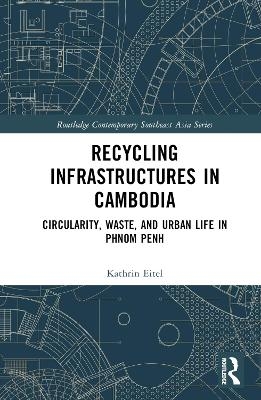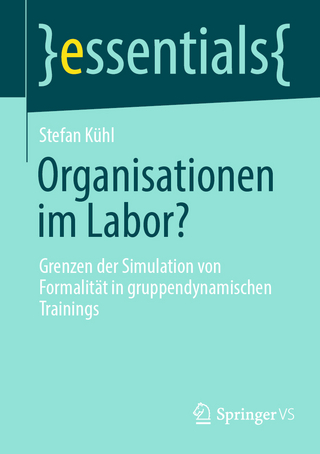
Recycling Infrastructures in Cambodia
Circularity, Waste, and Urban Life in Phnom Penh
Seiten
2022
Routledge (Verlag)
978-1-032-15466-4 (ISBN)
Routledge (Verlag)
978-1-032-15466-4 (ISBN)
This book examines the recycling infrastructure in Phnom Penh, Cambodia, considering the circular flows of waste and practices through ‘infracycles’, maintenance practices that tinker with the social and capitalist order. It will be of interest to environmental anthropology, science & tech, urban studies, & SEA studies.
This book examines the recycling infrastructure in Phnom Penh, Cambodia. It considers the circular flows of waste and practices through ‘infracycles’, maintenance practices that tinker with the social and capitalist order, and postcolonial ways of doing politics that co-constitute predominant waste fantasies from which naturecultures ooze out, shaping urban life in their own way.
In this context, socially marginalized waste pickers contest the capitalist system by creating tropes about freedom, labor autonomy, and the will to survive. In this regard, they are also meddling about a new social order that represents the fine line Cambodia is sashaying between tradition and modernity. Waste fantasies that are a result of environmental problematizations, however, perpetuate postcolonial ways of doing politics by exuding notions of waste as detached from its sociocultural context. But ultimately, waste slips through the cracks of these dominant imaginaries and global waste reduction models enacting new versions of what waste and the city is, providing opportunities for another future waste policy.
This book is a unique contribution to the field of infrastructure studies emphasizing the importance of perceiving infrastructure as circular in smaller ‘infracycles’, rather than linear. It will be of interest to researchers in the field of environmental anthropology, science and technology studies, urban studies, and Southeast Asian studies.
The Introduction of this book is available for free in PDF format as Open Access from the individual product page at www.routledge.com. It has been made available under a Creative Commons Attribution-Non Commercial-No Derivatives 4.0 license
This book examines the recycling infrastructure in Phnom Penh, Cambodia. It considers the circular flows of waste and practices through ‘infracycles’, maintenance practices that tinker with the social and capitalist order, and postcolonial ways of doing politics that co-constitute predominant waste fantasies from which naturecultures ooze out, shaping urban life in their own way.
In this context, socially marginalized waste pickers contest the capitalist system by creating tropes about freedom, labor autonomy, and the will to survive. In this regard, they are also meddling about a new social order that represents the fine line Cambodia is sashaying between tradition and modernity. Waste fantasies that are a result of environmental problematizations, however, perpetuate postcolonial ways of doing politics by exuding notions of waste as detached from its sociocultural context. But ultimately, waste slips through the cracks of these dominant imaginaries and global waste reduction models enacting new versions of what waste and the city is, providing opportunities for another future waste policy.
This book is a unique contribution to the field of infrastructure studies emphasizing the importance of perceiving infrastructure as circular in smaller ‘infracycles’, rather than linear. It will be of interest to researchers in the field of environmental anthropology, science and technology studies, urban studies, and Southeast Asian studies.
The Introduction of this book is available for free in PDF format as Open Access from the individual product page at www.routledge.com. It has been made available under a Creative Commons Attribution-Non Commercial-No Derivatives 4.0 license
Kathrin Eitel is a cultural anthropologist and a postdoctoral researcher at the Institute for Cultural Anthropology and European Ethnology at Goethe University Frankfurt/Main, Germany. Her work focuses on environmental matters, such as waste and water, queer ecologies and infrastructures.
Introduction: The Map to Begin With Part I – Embedded. A Past Futuring Chapter 1: Mapping the History of Waste Part II – Entangled. The Urban Recycling Infrastructure Chapter 2: Material Trajectories, Circulating People; Chapter 3: Tinkering with the New Order; Chapter 4: Interplays between Waste and Nature Part III – Emerging. Oozy Materialities Chapter 5: What Slips Through the Cracks?; Inferences – Re:cycling Infrastructures; References
| Erscheinungsdatum | 17.11.2022 |
|---|---|
| Reihe/Serie | Routledge Contemporary Southeast Asia Series |
| Zusatzinfo | 19 Halftones, black and white; 19 Illustrations, black and white |
| Verlagsort | London |
| Sprache | englisch |
| Maße | 156 x 234 mm |
| Gewicht | 412 g |
| Themenwelt | Sozialwissenschaften ► Soziologie ► Spezielle Soziologien |
| Technik ► Umwelttechnik / Biotechnologie | |
| ISBN-10 | 1-032-15466-7 / 1032154667 |
| ISBN-13 | 978-1-032-15466-4 / 9781032154664 |
| Zustand | Neuware |
| Haben Sie eine Frage zum Produkt? |
Mehr entdecken
aus dem Bereich
aus dem Bereich
eine Einführung
Buch | Softcover (2024)
De Gruyter Oldenbourg (Verlag)
CHF 41,90
Grenzen der Simulation von Formalität in gruppendynamischen Trainings
Buch | Softcover (2024)
Springer VS (Verlag)
CHF 20,95


